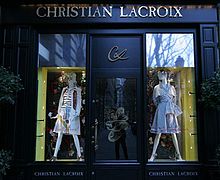| Revision as of 06:50, 24 October 2014 editMark Wilsons (talk | contribs)170 editsNo edit summary← Previous edit | Revision as of 02:16, 29 October 2014 edit undoMark Wilsons (talk | contribs)170 editsm Fixed grammarNext edit → | ||
| Line 5: | Line 5: | ||
| A '''boutique''' is "a small store that sells stylish clothing, jewelry, or other usually expensive things".<ref>{{cite web|url=http://www.merriam-webster.com/dictionary/boutique|website=Merriam-Webster's Dictionary|accessdate=1 October 2014}}</ref> The word is ] for "shop", which is drawn from the Latin term ] ἀποθήκη (''apothēkē''), which means "storehouse".<ref>, on Oxford Dictionaries</ref><ref>, Henry George Liddell, Robert Scott, ''A Greek-English Lexicon'', on Perseus</ref> | A '''boutique''' is "a small store that sells stylish clothing, jewelry, or other usually expensive things".<ref>{{cite web|url=http://www.merriam-webster.com/dictionary/boutique|website=Merriam-Webster's Dictionary|accessdate=1 October 2014}}</ref> The word is ] for "shop", which is drawn from the Latin term ] ἀποθήκη (''apothēkē''), which means "storehouse".<ref>, on Oxford Dictionaries</ref><ref>, Henry George Liddell, Robert Scott, ''A Greek-English Lexicon'', on Perseus</ref> | ||
| The term "boutique" entered into the everyday English language in the late 1960s when, for a brief period, ] was the fashion capital. ] and ] (London) were the focus of much of the media's attention for having the most fashionable boutiques of the era.<ref></ref> | The term "boutique" was entered into the everyday English language in the late 1960s when, for a brief period, ] was the fashion capital. ] and ] (London) were the focus of much of the media's attention for having the most fashionable boutiques of the era.<ref></ref> | ||
| This term can also refer to a specialized firm such as a boutique ] or ]. The word is often used to describe a property in the independent section of the hotel market (such as The Rockwell in ]) in order to distinguish itself from larger chains (such as ]). In such cases, the establishment aims to convey the idea that its operation is elite and highly specialized. | This term can also refer to a specialized firm such as a boutique ] or ]. The word is often used to describe a property in the independent section of the hotel market (such as The Rockwell in ]) in order to distinguish itself from larger chains (such as ]). In such cases, the establishment aims to convey the idea that its operation is elite and highly specialized. | ||
Revision as of 02:16, 29 October 2014
| This article may require copy editing for grammar, style, cohesion, tone, or spelling. You can assist by editing it. (August 2014) (Learn how and when to remove this message) |


A boutique is "a small store that sells stylish clothing, jewelry, or other usually expensive things". The word is French for "shop", which is drawn from the Latin term Greek ἀποθήκη (apothēkē), which means "storehouse".
The term "boutique" was entered into the everyday English language in the late 1960s when, for a brief period, London was the fashion capital. Carnaby Street and Kings Road (London) were the focus of much of the media's attention for having the most fashionable boutiques of the era.
This term can also refer to a specialized firm such as a boutique investment bank or boutique law firm. The word is often used to describe a property in the independent section of the hotel market (such as The Rockwell in London) in order to distinguish itself from larger chains (such as Hilton Hotels). In such cases, the establishment aims to convey the idea that its operation is elite and highly specialized.
In the strictest sense of the word, boutique would be one of a kind. However, more generally speaking, some chains can be referred to as boutiques if they specialize in particular styles.
Recently, the term "boutique" has begun to be applied to mass-market items that are either niche or produced in intentionally small numbers to be sold at very high prices. This can be referred to as boutique manufacturing. For example, before the release of the Wii, a Time Magazine article suggested that Nintendo could become a "boutique video-game company", producing games for niche audiences rather than trying to compete directly with Microsoft and Sony.
Although some boutiques specialize in hand-made items and other unique products, others simply produce T-shirts, stickers, and other fashion accessories in artificially small runs and sell them at high prices.
In the late 1990s, some European retail traders developed the idea of tailoring a shop towards a lifestyle theme, in what they called "concept stores", which specialized in cross-selling without using separate departments. One of the first concept stores was 10 Corso Como in Milan, Italy, followed by Colette in Paris and Quartier 206 in Berlin. Several well-known American chains such as Urban Outfitters, D-A-S-H, and The Gap, Australian chain Billabong and, though less common, Lord & Taylor, adapted to the concept store trend after 2000.
See also
Notes
- Merriam-Webster's Dictionary http://www.merriam-webster.com/dictionary/boutique. Retrieved 1 October 2014.
{{cite web}}: Missing or empty|title=(help) - boutique, on Oxford Dictionaries
- ἀποθήκη, Henry George Liddell, Robert Scott, A Greek-English Lexicon, on Perseus
- Frederick, Jim (December 8, 2003). "The Console Wars: Game On". Time. Retrieved April 26, 2010.
- http://www.earthtimes.org/articles/show/borders-unveils-first-concept-store,279823.shtml
- "New retailers floor customers". Sydney Morning Herald. April 19, 2004. Retrieved 2008-10-29.
- http://www.wwd.com/retail-news/colette-unveils-redesigned-store-interior-1724393?justin=1724393
- http://fashionweek.unlike.net/locations/301356-Quartier-206
- http://www.berlin-partner.de/fileadmin/chefredaktion/documents/pdf_Publikationen_en/Fashion_in_Berlin_en.pdf
- "Urban Outfitters: Dressed For Success". Forbes. December 20, 2007.
- Wernick, Ellen (2003). "Urban Outfitters, Inc". International Directory of Company Histories.
- http://www.vogue.co.uk/news/daily/080829-colette-and-gap-collaborate.aspx